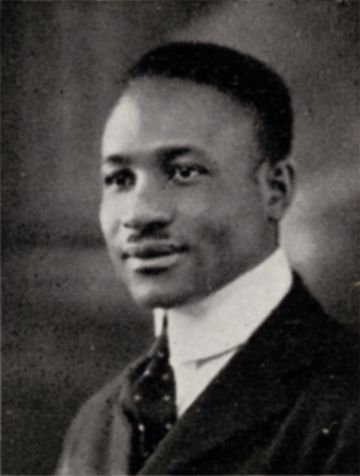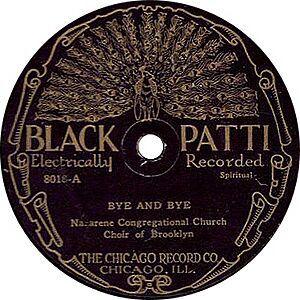J. Mayo Williams facts for kids

Williams in 1920
|
|
| Born: | September 25, 1894 Pine Bluff, Arkansas |
|---|---|
| Died: | January 2, 1980 (aged 85) Chicago, Illinois |
| Career information | |
| Position(s) | End |
| Height | 5 ft 11 in (180 cm) |
| Weight | 174 lb (79 kg) |
| College | Brown |
| Career history | |
| As player | |
| 1921 | Canton Bulldogs |
| 1921–1923 | Hammond Pros |
| 1924 | Dayton Triangles |
| 1924 | Hammond Pros |
| 1925 | Cleveland Bulldogs |
| 1925–1926 | Hammond Pros |
| Career highlights and awards | |
|
|
| Military career | |
| Allegiance | |
| Service/ |
|
| Years of service | 1917–1919 |
| Battles/wars | World War I |
Jay Mayo "Ink" Williams (born September 25, 1894 – died January 2, 1980) was an important African-American producer of blues music. He helped many talented musicians record their songs. Some people thought his nickname "Ink" came from getting musicians to sign contracts. But it was actually a nickname from his football days. He was one of the few Black players on mostly white teams. He became the most successful producer of "race records" during his time. These records were made by and for Black artists.
Early Life and Football
Williams was born in Pine Bluff, Arkansas. His parents were Millie and Daniel Williams. When he was seven years old, his father died. His family then moved to his mother's hometown of Monmouth, Illinois. This is where he grew up.
Williams went to Brown University. He was a great track athlete there. He was also an amazing football player. During this time, he served in the First World War. After college, in the 1920s, he played professional football. He was one of only three Black athletes to play in the early National Football League. His football career lasted until 1926. He played for teams like the Canton Bulldogs and the Cleveland Bulldogs.
A Pioneer in Music
Even though he played football, music was his true passion. After graduating from college in 1921, he moved to Chicago. In 1924, he joined Paramount Records. This company had just started making "race" records. These were recordings by Black artists for Black audiences.
Williams became a talent scout for Paramount. He also supervised recording sessions in the Chicago area. He quickly became the most successful blues producer of his time. He discovered many amazing artists. Two of his biggest finds were singer Ma Rainey and Papa Charlie Jackson. Jackson was the first blues singer to become famous while playing his own music.
Williams also recorded many other famous musicians. These included Blind Lemon Jefferson, Tampa Red, and Jelly Roll Morton. He even managed a group of songwriters.
In 1927, Williams left Paramount Records. He started his own company called The Chicago Record Company. He released jazz, blues, and gospel music on his "Black Patti" label. One of his releases was "Original Stack O' Lee Blues." This is thought to be the first recording of the famous song "Stagger Lee."
His company, Black Patti, did not last long. Williams then moved to Brunswick Records. He also worked with its sister label, Vocalion. There, he recorded artists like Clarence "Pine Top" Smith. After a big economic downturn in 1929, record sales dropped. Williams then found new work. He became a football coach at Morehouse College in Atlanta.
Building a Music Empire
In 1934, Williams was hired by Decca. He became the head of their "race records" department. At Decca, he recorded many more legendary musicians. These included Mahalia Jackson, Alberta Hunter, and Sister Rosetta Tharpe. He also helped make small group sounds popular. Groups like The Harlem Hamfats became famous.
Some Black musicians felt Williams acted differently. They thought he seemed like he was part of the white middle class. He tried to make rural blues artists sound more polished. He also tried to improve their public image. Sometimes, this was not understood well by the artists.
Besides producing, Williams also managed some of the artists he recorded. He even shared ownership of some songs as a co-writer. He helped write songs like "Corrine, Corrina" and "Keep A Knocking."
Williams started the Chicago Music Publishing Company (CMPC). This company published all the songs he recorded. The CMPC collected money from song sales. It was supposed to share some of that money with the artists. However, some successful artists, like Blind Blake, might not have received all the money they earned from their songs.
Later Career and Legacy
Williams left Decca in 1945. After that, he worked on his own. He also ran several small, independent record labels. From 1945 to 1949, he ran the Harlem label in New York City. He also had the Chicago, Southern, and Ebony labels in Chicago. He recorded a young Muddy Waters on one of these labels.
After working freelance for a while, he reopened the Ebony label in 1952. He kept it going until the early 1970s. During this time, he recorded artists like Lil Armstrong.
J. Mayo Williams died in a Chicago nursing home on January 2, 1980. People were planning to interview him to write down his life story.
Williams was a member of the National Football Hall of Fame Association. In 2004, he was honored for his contributions to music. He was added to the Blues Hall of Fame after his death.
 | Misty Copeland |
 | Raven Wilkinson |
 | Debra Austin |
 | Aesha Ash |


